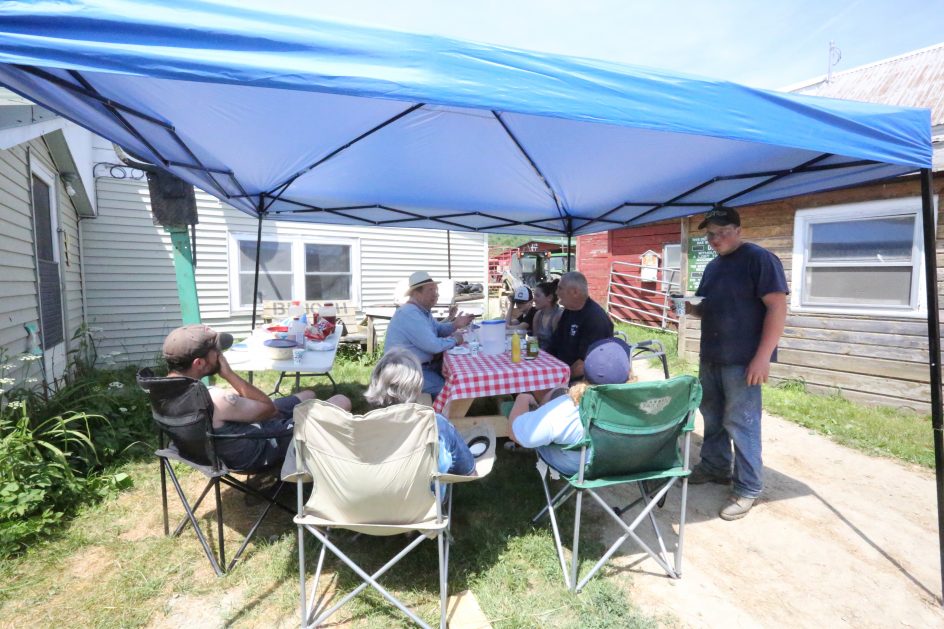
Every Father’s Day, the Gulleys set up a tent and the family gatherers to celebrate Ed’s role as a father. There is a great sense of family, the sons and daughters and their sons and daughters come, you get the sense the kids have all grown up around one another and are close.
Their love and respect for Ed is striking, and stirring.
The Gulley children are quiet, they don’t do much small talk, they don’t talk politics, they come alive when there is farm talk – intense talk about farms, crops, tractors, weather, milk prices, yields and cows. Ed tells stories of his farm and other farms, and the kids join in with some of their stories.
There is a lot of talk about feed and seed. The farm family is unique, so unlike my own family and most families in its closeness and the degree to which the families and children all know one another and are really one large family, not several. Maria and I are outsiders, the kids are shy and rarely ask any questions.
We are accepted and comfortable among them, but not of them, that is always clear.
Ed was in a good mood today, full of stories and memories. He was talkative and visibly tired. So is Carol.
Nobody speaks of it, but this Father’s Day has a special feel and edge to it, we are wondering if it might be the last one. Ed has inoperable brain cancer. We don’t really know what will happen next.
Nobody talked about it, but we could all feel it in the very air of the farm.
When the farm chatter heats up, we say goodbye.
We can’t really join in that, and we don’t want to interrupt it. It makes this family comfortable and at ease. These people deserve all the time they can get with Ed, they love him so much. The day had a warm feeling, everyone who leaves hugs and kisses Ed, there is much love in the tent.
There is, around these gatherings, another sadness, another elephant in the room, that is the decline of the family farm itself.
There is a gloom among farmers these days, a cloud, a sense of fatalism.
Farmers are eternal optimists, banking on a ride in milk prices, or some sane help from the government, or just one politician in all the world keeping their promises to them. But they are also realists, they are losing hope.
This month, as milk prices plunged to their lowest level since 1970, milk producers are mailing out suicide prevention pamphlets with milk checks. More than dozen dairy farmers have killed themselves so that their families can collect the insurance and keep their farms alive.
The farmers seem resigned now, and increasingly hopeless, those that can diversifying, getting day jobs, selling cows and land. The farm is no longer something that can be left to a child you love in most cases, just too dicey. There is the deepening sense that the farm as we know is over, there is no longer much real hope.
Farming is now an agribusiness, lots of cows, lots of land, lots of debt, lots of big machines, no one really caretaking or understanding the land. When you listen to Ed and his children, you sense a great passion for and understanding of the land, the soil.
The farm is not a business, but a calling.
All over the country, writes author and farmer Wendell Berry, the farmland is in general decline. “ Fields and whole farms abandoned, given up with their scars unmended, washing away under the weeds and bushes ; fine land put to row crops year after year, without rest or rotation; buildings and fences going down; good houses standing empty, unpainted, their windows broken.
And it is clear to anyone who looks carefully at any crowd that we are wasting our bodies exactly as we are wasting our land. Our bodies are fat, weak, joyless, sickly, ugly, the virtual prey of the manufacturers of medicine and cosmetics. Our bodies have become marginal; they are growing useless like our “marginal” land because we have less and less use for them.
As for our spirits, they seem more and more to comfort themselves by buying things. No longer in need of the exalted drama of grief and joy, they feed now on little shocks of greed, scandal, and violence. For many of the churchly, the life of the spirit is reduced to a dull preoccupation with getting to Heaven.”
While politicians fatten up on lobbyists and billionaires, our farms are fading into history, the economists and politicians approve, they have long argued that family farms are too inefficient to be allowed to survive in the new global economy. Berry believes this decline is closely tied to the death of the family farm, and the values and community they spawned.
From where I sat today in Ed’s tent, I wholeheartedly agree with him.

The government is subsiding “Big farms” which do not treat their animals humanity – The chickens are coped up in cages where they cannot even open their wings- This applies to all animals – (pigs, cows do not any kind of space to more) I could go on and on but the big farms contribute to global warming in that their wastes pollute the waters and the chemicals (antibiotics ) they put in the animals feed – are passed down to humans – We eat the meat and drink the milk which contributes to diseases like cancer , heart problems etc- These huge farms have caused the “Local farmers” their living and farms and as you mentioned suicide . Thanks to our politics we are becoming depressed and hopeless in our government.